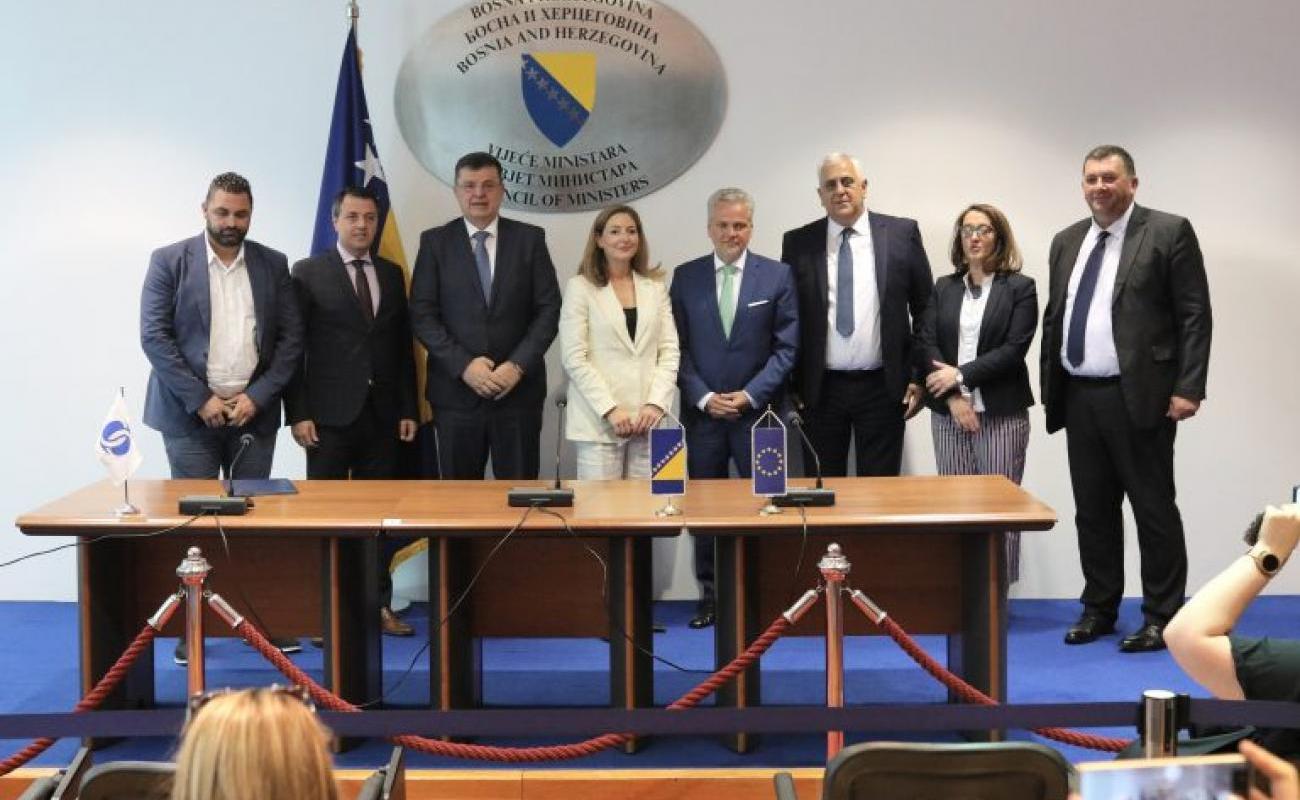New 43.8 million EU grants for important infrastructure projects in BiH

In the premises of the BiH Parliamentary Assembly, three EU grant agreements to the value of 43.8 million euros were signed today. The new grant funds are aimed at continuing the construction of Corridor Vc and improving the water supply system in Visoko and surrounding settlements, in accordance with the overall objectives of the European Union to support Bosnia and Herzegovina with economic growth, investment and improvements to the quality of life of citizens on the country’s path to the EU.
The first two contracts refer to the financing of two new sections on Corridor Vc; the Rudanka interchange – Putnikovo Brdo tunnel and the Putnikovo Brdo tunnel – Medakovo interchange, to the value of 42.8 million euros. The third contract allocates additional funds for the expansion and rehabilitation of the water supply network to a large part of the town of Visoko and Moštre, and the construction of a main reservoir in Dubrava.
The grant agreements were signed by the Minister of Finance and Treasury of Bosnia and Herzegovina, Zoran Tegeltija, and the Head of the EBRD for Bosnia and Herzegovina, Manuela Naessl, in the presence of the Head of the EU Delegation and EU Special Representative to Bosnia and Herzegovina, Ambassador Johann Sattler, as well as Autoceste FBiH Advisor Merima Karabegović, Autoputevi RS Executive Directors Miroslav Bajić and Siniša Gavrić, Visoko Mayor Mirza Ganić and Visoko Public Waste Management Company Director Almir Hadžialić.
“The EU will continue to be a loyal friend and partner to Bosnia and Herzegovina, providing support for projects which have a concrete beneficial impact for people in this country. I am glad that following the signature of today’s grant agreements, further sections of the important Corridor Vc motorway can be built, and also that the water supply around Visoko will be renovated to ensure access to safe drinking water,” said Ambassador Sattler, adding that the EU’s grant contribution to Corridor Vc over the years has significantly increased, resulting in the current 40% contribution.
In addition to grants provided by the EU, these projects will also receive favourable loans from the European Bank for Reconstruction and Development (EBRD), which, along with the European Investment Bank (EIB), is a strategic partner of the European Union.
“Together with our European partners, we are determined to continue to support Bosnia and Herzegovina in completing the construction of Corridor Vc. The new motorway is already helping improve the quality of transport and doing business in the country, and we look forward to future progress in construction,” said Naessl.
At the ceremony of signing the EU grants, Minister Tegeltija said: “I wish to emphasize the importance of investments from European Union funds to such projects. Grants donated by the European Union support implementers who are users of loans, and help them finance various activities such as supervision and consulting services, but also directly fund construction work. I hope for continued good cooperation in the future, and I wish the users of these funds to complete the work on time.”
The construction of Corridor Vc is a strategic priority for BiH and is expected to contribute to faster economic and social development. The section of Corridor Vc in BiH is 325 kilometres long and, with 148 bridges and 46 tunnels, the highway is currently the largest construction project in the country. For the construction of Corridor Vc, the European Union has so far allocated around 570 million euros in grants.
The project to expand the water supply network in Visoko will enable the connection of new consumers and, at the same time, through the provision of running water, improve the standard of living for about 33,000 citizens in the Municipality of Visoko and the surrounding settlements. The investments will enable the renovation of around 1,400 household connections and the establishment of around 2,000 new household connections.
EU grants were provided through the Western Balkans Investment Framework (WBIF), which aims to improve regional connectivity by building new transport links and renovating outdated transport and utility infrastructure.
